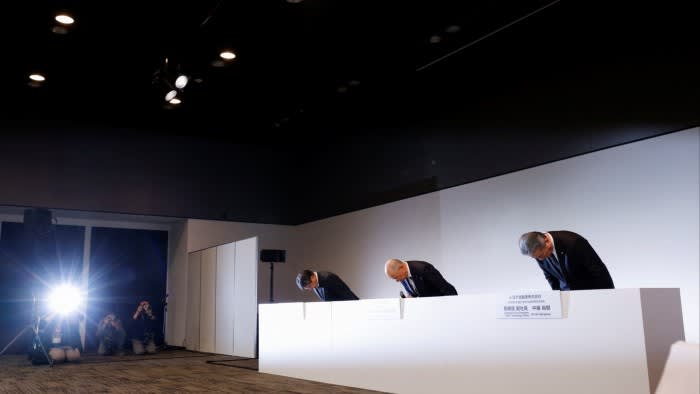
Unlock the Editor’s Digest for free
Roula Khalaf, Editor of the FT, selects her favourite stories in this weekly newsletter.
Toyota’s Daihatsu subsidiary has halted worldwide vehicle shipments after an independent investigation found widespread irregularities in crash safety testing dating back more than three decades.
The widening scandal at Daihatsu is the latest to hit Japan’s largest carmaker after its truck unit Hino last year admitted to falsifying emissions data.
Daihatsu said on Wednesday that the scope was far bigger than when it first revealed in April that collision safety testing for some of its vehicles had not been carried out properly.
While it was “temporarily” halting shipments, it said it did not know how long the suspension would last. The move is voluntary and it said it planned to stop shipping until its vehicles were certified using the right procedures.
A third-party investigation panel has now discovered 174 safety irregularities, which affected a total of 64 models including 22 models sold by Toyota. Affected countries include Japan, Malaysia, Thailand, Mexico and Uruguay.
Daihatsu said it was not aware of any accidents caused by the safety issues, which also affected models supplied to Mazda and Subaru.
The oldest irregularity dates back to 1989, but the panel said the number of safety incidents had increased since 2014. The investigation found that some employees skipped procedures for side-collision safety tests and falsified or manipulated testing data — often under “intense pressure” to meet tight deadlines to develop new vehicles.
“The employees engaged in the procedural irregularities can be considered as victims of management and cannot be strongly condemned,” the panel said in the report. “Therefore, Daihatsu executives are the first to be blamed.”
It concluded that the improper testing was not done systematically with the involvement of senior managers, blaming a work environment that lacked transparency and proper oversight.
Toyota promised “a fundamental reform” to revive its subsidiary. “At Toyota, we feel a very heavy responsibility as the parent company,” Hiroki Nakajima, chief technology officer, said at a joint news conference.
He added that the company was not aware of the pressures placed on Daihatsu employees as its subsidiary increased overseas production of compact cars for Toyota and other carmakers.
Daihatsu accounted for 7 per cent of Toyota’s global revenues from 9.2mn vehicles sold during the first 10 months of the year. The wholly owned subsidiary manufactured 1.1mn vehicles during the same period, accounting for almost 12 per cent of the group’s overall production volume.
Daihatsu president Soichiro Okudaira said he had not expected misconduct from employees, even as other carmakers including Mitsubishi Motors and Suzuki became embroiled in a fuel economy data scandal in recent years. He noted that “lean production” had been Daihatsu’s strength.
“I now regret deeply that I did not realise that our employees [in charge of the testing procedures] were struggling in a corporate culture where they could not raise their voices,” Okudaira said.


